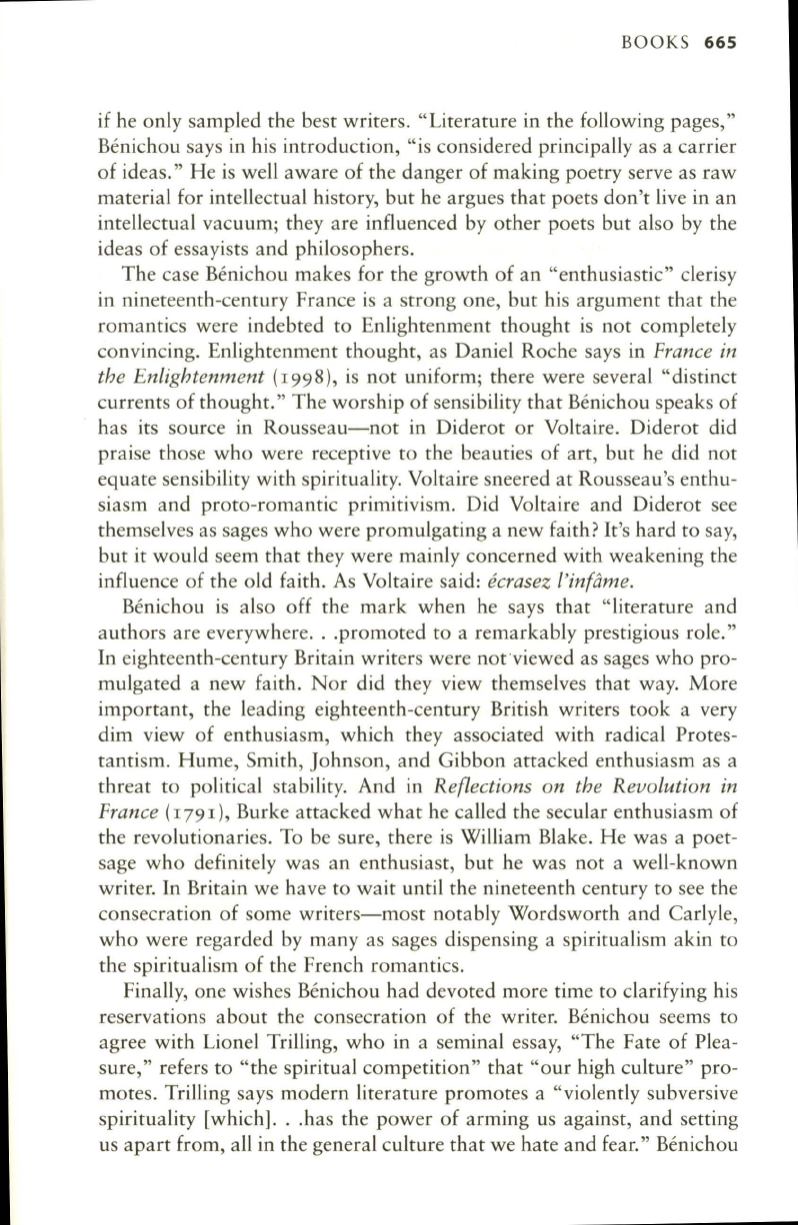
BOOKS
665
if he only sampled the best writers. "Literature in the following pages,"
Benichou says in his introduction, "is considered principally as a carrier
of ideas." He is well aware of the danger of making poetry serve as raw
material for intellectual history, but he argues that poets don't live in an
intellectual vacuum; they are influenced by other poets but also by the
ideas of essayists and philosophers.
The case Benichou makes for the growth of an "enthusiastic" clerisy
in nineteenth-century France is a strong one, but his argument that the
romantics were indebted to Enlightenment thought is not completely
convincing. Enlightenment thought, as Daniel Roche says in
France in
the Enlightenment
(1998),
is not uniform; there were several "distinct
currents of thought." The worship of sensibility that Benichou speaks of
has its source in Rousseau-not in Diderot or Voltaire. Diderot did
praise those who were receptive to the beauties of art, but he did not
equate sensibility with spirituality. Voltaire sneered at Rousseau's enthu–
siasm and proto-romantic primitivism. Did Voltaire and Diderot see
themselves as sages who were promulgating a new faith? It's hard to say,
but it would seem that they were mainly concerned with weakening the
influence of the old faith. As Voltaire said:
ecrasez l'infame.
Benichou is also off the mark when he says that "literature and
authors are everywhere...promoted
to
a remarkably prestigious role."
In eighteenth-century Britain writers were not ·viewed as sages who pro–
mulgated a new faith. Nor did they view themselves that way. More
important, the leading eighteenth-century British writers took a very
dim view of enthusiasm, which they associated with radical Protes–
tantism. Hume, Smith, Johnson, and Gibbon attacked enthusiasm as a
threat to political stability. And in
Reflections on the Revolution in
France
(1791),
Burke attacked what he called the secular enthusiasm of
the revolutionaries. To be sure, there is William Blake. He was a poet–
sage who definitely was an enthusiast, but he was not a well-known
writer. In Britain we have
to
wait until the nineteenth century to see the
consecration of some writers-most notably Wordsworth and Carlyle,
who were regarded by many as sages dispensing a spiritualism akin
to
the spiritualism of the French romantics.
Finally, one wishes Benichou had devoted more time to clarifying his
reservations about the consecration of the writer. Benichou seems to
agree with Lionel Trilling, who in a seminal essay, "The Fate of Plea–
sure," refers
to
"the spiritual competition" that "our high culture" pro–
motes. Trilling says modern literature promotes a "violently subversive
spirituality [which] . ..has the power of arming us against, and setting
us apart from, all in the general culture that we hate and fear." Benichou


